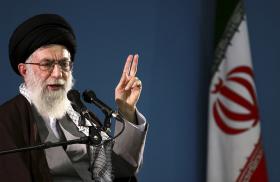Note: Mr. Khalilzad's remarks represent his own views and not necessarily those of the U.S. government.
I want to give you the Bush administration's perspective on where we are and what our vision is for Iraq. We believe that Saddam Husayn's regime is determined to retain, expand, and once again use weapons of mass destruction (WMD), and that the regime is ready to employ such weapons not only at home, but also abroad. The administration is now determined to disarm Iraq one way or another. No decision for use of force has been made. We do not look forward to a war with Iraq. We have no desire for war.
War is not inevitable, but action is. We are working with Congress to secure an effective resolution that ensures that the president has the options necessary to deal with the threat that Saddam poses. Similarly, we are working with the United Nations (UN) to disarm the regime and secure an effective resolution that will end Saddam's defiance of past Security Council resolutions. We believe that Saddam is in material breach of his commitments to the UN. We believe he threatens regional and global stability. He does so through terrorism. He does so by holding his country hostage and using its resources to build WMD and the missiles to deliver them.
In order to avoid the use of force, Saddam must take the actions necessary to comply with all Security Council resolutions. Words will not suffice. Our position is that, one way or another, this threat will be dealt with and dealt with in short order. (Applause.)
Should force be required, U.S. and coalition forces will liberate the Iraqi people from Saddam's tyranny. We will not enter Iraq as conquerors. We will not treat the Iraqi people as a defeated nation. As President George W. Bush has said, the liberty of the Iraqi people is a great moral cause and a great strategic goal. Our mission in Iraq will be to serve the interests and the hopes of the Iraqi people. We regard them as a gifted and great people with an ancient culture. They, like people everywhere, deserve freedom.
Our objectives for the long term in Iraq will be to establish a broad-based representative and democratic government -- a government that will renounce terror and WMD, respect international laws and norms, give all religious and ethic groups a voice, adhere to the rule of law, and become an example of peace and tolerance for the region as a whole.
In the short term, we will reunify Iraq, because at the present time the country is not unified. We will maintain its territorial integrity. We will also meet the humanitarian needs of the Iraqi people and initiate a major reconstruction program that will put Iraq on the path to greater economic prosperity. It is our objective to have plans in place on each of these issues before the use of force becomes necessary.
We understand, however, that the challenge of building such an Iraq is a major one. The costs will be significant. We will work with the Iraqi people in developing detailed plans, and the Iraqis will play a significant role in shaping those plans; we are optimistic about the contribution that they can make. Iraq has an educated and industrious population and is endowed with great natural wealth. It has a history of law, scholarship, and culture. Both the United States and a significant portion of the international community are prepared to help.
We believe that three sets of challenges will follow the liberation of Iraq. First will be political reconstruction. This will involve thorough reform of the Iraqi government. "De-Ba'athifying" Iraq means removing those elements used by Saddam to enforce his tyranny on the Iraqi people. Officials found guilty of crimes against humanity will be prosecuted. The larger issue of the transition to justice will be settled by Iraqis themselves.
Second, the economy will need to be reformed to put Iraq on the path to prosperity. The United States is committed to ensuring that the Iraqi people's oil patrimony will be used to meet their own economic and reconstruction needs. Third, with regard to security reconstruction, Iraq's international borders will be protected and respected. Security inside Iraq will be critical. The violence inflicted by Saddam on the people of Iraq has left serious scars. These problems need to be resolved by a reformed Iraqi judicial system, not by guns. Iraq after Saddam will have the rule of law, not the rule of guns.
Iraqis themselves are already working on these complex issues. The U.S. government's Future of Iraq Project working groups have been discussing the issues for some time. Sixteen mixed groups that represent the rich variety of the Iraqi people are participating in these efforts. These groups are examining questions that are critical to Iraq's post-Saddam future. Many Iraqis have been held back from participating in such activities by Saddam's regime, a regime that has chosen to waste Iraq's resources on miscalculated military adventures, palaces, and paying the families of suicide bombers.
As I said before, transforming Iraq will not be easy. It will take time and it will involve costs for the United States. The president believes that these costs are worth paying. If we succeed, as we are determined to, we will achieve a great deal. We will eliminate the WMD threat from Iraq. We will decrease the threat that Iraq poses to regional peace and stability. And in transforming Iraq, we will take a significant step in the direction of the long-term need to transform this dysfunctional region as a whole. (Applause.)


